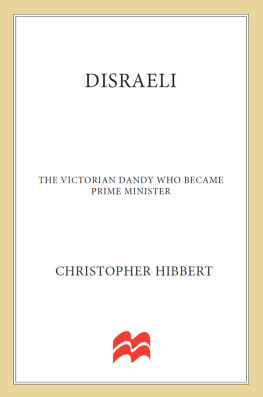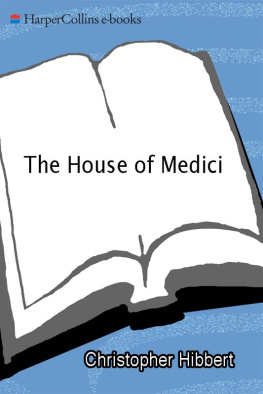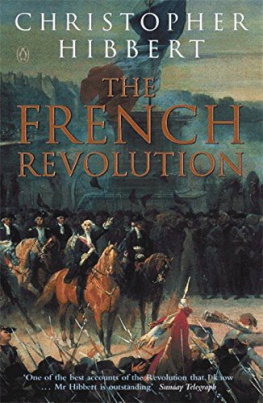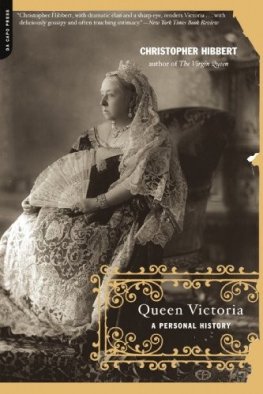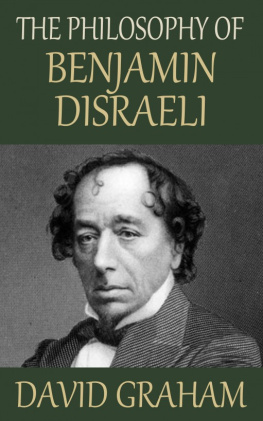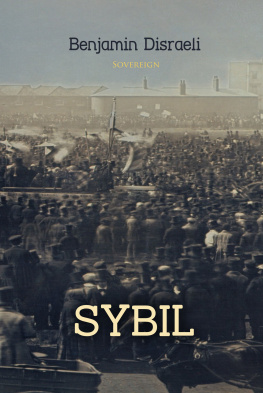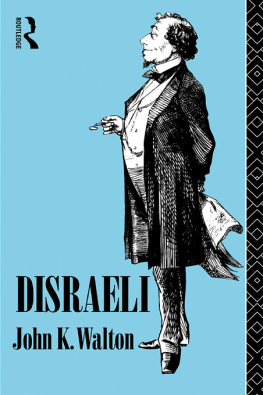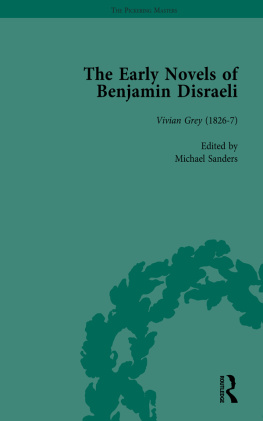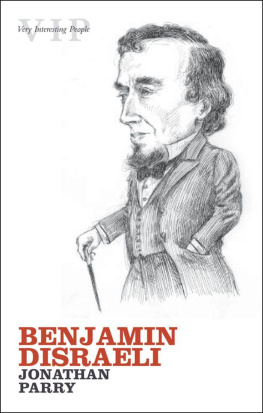1

BOYHOOD
He had a taste, not uncommon among schoolboys, for little acts of bargaining and merchandise.
I N CONVERSATION WITH HIS FRIEND , Lord Barrington, Benjamin Disraeli once observed, I was born in a set of chambers in the Adelphi I may say in a library, for all my fathers rooms were full of books. Like many of the accounts he gave in later years of his family, his childhood and youth, this was not, in fact, true. His fathers rooms were certainly full of books, which Isaac DIsraeli, a bibliophile if not a great scholar, would take pleasure in arranging and rearranging, constantly adding to his collection until it numbered no fewer than twenty-five thousand volumes, taking notes from them on scraps of paper which he would tuck between their leaves, peering at the print shortsightedly, his eyes behind thick spectacles, his chin concealed behind the folds of his white neckcloth, a small black velvet cap over his long curly hair, emerging from his library to talk loquaciously and disjointedly over his meals.
His eldest son, Benjamin, was not, however, born in these chambers in the Adelphi which the Adam brothers had built on land granted to them by the Duke of St Albans not long before. Isaac DIsraeli had lived there as a bachelor; but, not long after his marriage, he had moved to Bloomsbury, to 6 Kings Road, Bedford Row, now 22 Theobalds Road, and it was here, in a house overlooking Grays Inn Garden, that Benjamin was born at half past five on the morning of 21 December 1804.
On the eighth day of his life, a large group of men in black hats
For these relations Benjamin was to provide an exotic and largely fictitious ancestry. They were, he liked to think and to say, of Italian descent from one of those Hebrew families whom the Inquisition forced to emigrate from the Spanish Peninsula at the end of the fifteenth century, and who found a refuge in the more tolerant territories of the Venetian republic They assumed the name of DISRAELI, a name never borne before, or since, by any other family, in order that their race might be for ever recognised They flourished as merchants for more than two centuries under the protection of the Lion of St Mark.
Proud of his Jewish ancestry, Disraeli, in his novel, Contarini Fleming, was to ask if the mixed population of Saxons and Normans, among whom he had first seen the light of day, was of purer blood than he? Oh no, he was descended in a direct line from one of the oldest races in the world, from that rigidly separate and unmixed Bedouin race who had developed a high civilization at a time when the inhabitants of England were going half-naked and eating acorns in their woods.
What at least could be said for certain about his forebears was that Disraelis grandfather, also Benjamin, and spelling the name DIsraeli, came to England at the age of eighteen in 1748, the twenty-first year of the reign of King George II, leaving behind two sisters who presided over a school for fellow-Jews in the Venetian ghetto.
A bright young man, Benjamin DIsraeli soon found employment in a Jewish firm in Fenchurch Street which imported goods from Italy. After working for this firm for some years, he married a Spanish Jewess whose family, so his grandson liked to suppose, was far more distinguished than it was and, soon afterwards, he set up his own business as an importer of coral and of those fashionable straw hats from Leghorn so often to be seen in portraits of young ladies by Thomas Gainsborough.
His wife having died in 1764, Benjamin DIsraeli married again within four months and, as with the first wife, his grandson chose to ascribe to the second a more distinguished lineage than she possessed. She was a grumpy, dispiriting woman and her grandson comparing her to those imperious women, Catherine the Great, Sarah, Duchess of Marlborough and the loftily intimidating Frances Anne, Marchioness of Londonderry ever afterwards recalled the dreaded weekly visits to her house where there was no kindness, no tea, no tips nothing. In her eighty-third year she came to stay in her sons house and behaved in a kindly manner that astonished all. Depend upon it, her daughter-in-law suggested with well-founded prescience, she is going to die.
After an initially unsuccessful diversification of his business into that of financial speculation, Benjamin DIsraeli became sufficiently prosperous as a stockbroker to buy an impressive country house, attributed to Sir Christopher Wren, at Enfield, where his grandson described him as eating macaroni with his dear friend Sir Horace Mann, for forty-six years British envoy at Florence, although, in fact, the Mann referred to was Sir Horaces nephew and heir, Horatio, Member of Parliament for Sandwich.
After a contented life, which would have been even more so had not his second wife been almost as difficult and demanding as his first, Benjamin DIsraeli, known to his neighbours as Old Mr Israel, died in 1816, leaving what was then an extremely large fortune of 35,000 which, in todays terms, would have been worth well over 1 million.
His only son, Isaac DIsraeli, was then forty years old. He had been a difficult, rather morose child, showing little or no interest in his fathers business and apparently, on one occasion, had run away from home and been found lying on a tombstone in Hackney churchyard. His kindly father, profoundly relieved, hugged him and gave him a pony, much, no doubt, to the annoyance of his stricter mother who firmly believed that to spare the rod was to spoil the child.
He was certainly industrious and, despite the diffidence of his manner, assuming. He left one of his poems at Bolt Court for the approval of Samuel Johnson, who was too ill to take notice of it; he approached Vicesimus Knox, master of Tonbridge Grammar School, with the suggestion that he might become a clerkly member of his household in the medieval manner; he sent examples of his work to the topographer and antiquary, Richard Gough; he sought the patronage of Henry James Pye, the future Poet Laureate, whose talents, slender as they were, had been recognized by the Prime Minister, William Pitt, for his support in the House of Commons; and he made the acquaintance of Samuel Rogers, the witty poet and generous host. He also met the antiquary, Francis Douce, on one of his regular visits to the British Museum.

